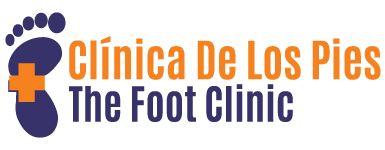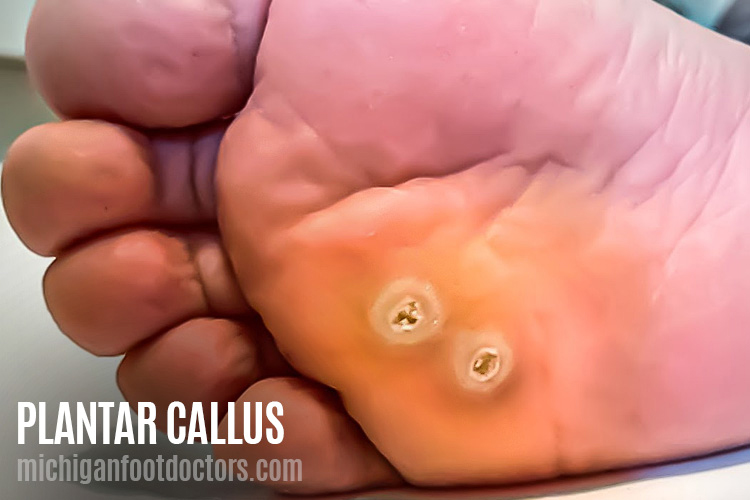
WHAT ARE THEY?
Corns and calluses are skin that becomes thickened, hardened which develop as skin attempts to protect itself from repetitive motions like rubbing and strong, abnormal pressure. friction and pressure. They most often develop on the feet and toes or hands and fingers. Corns and calluses can be unsightly.
If you’re typically a healthy person, you’ll only need treatment for corns and calluses if they are causing you annoyance or pain. Typically by eliminating the source of the rubbing, or pressure makes corns and calluses disappear over time. Now, If you have Diabetes or another condition that causes poor blood flow to your feet, you’re at risk of complications. Seek the Doctor’s advice on care for corns and calluses when you have diabetes.
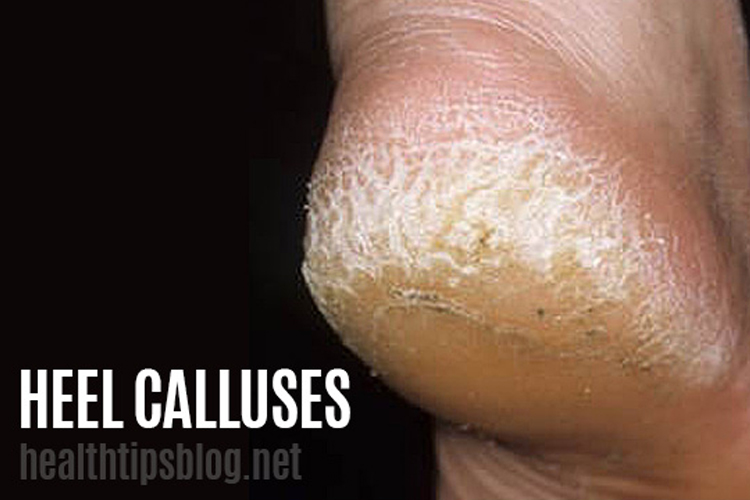
CAUSES OF CALLUSES
- Pressure and friction from repetitive actions cause corns and calluses to develop and grow. Some sources of this pressure and friction include:
- Wearing ill-fitting shoes. Tight shoes and high heels can compress areas of your feet. When footwear is too loose, your foot may repeatedly slide and rub against the shoe. Your foot may also rub against a seam or stitch inside the shoe.
- Skipping socks. Wearing shoes and sandals without socks can cause friction on your feet. Socks that don’t fit properly also can be a problem.
- Playing instruments or using hand tools. Calluses on your hands may result from the repeated pressure of playing instruments, using hand tools or even writing.
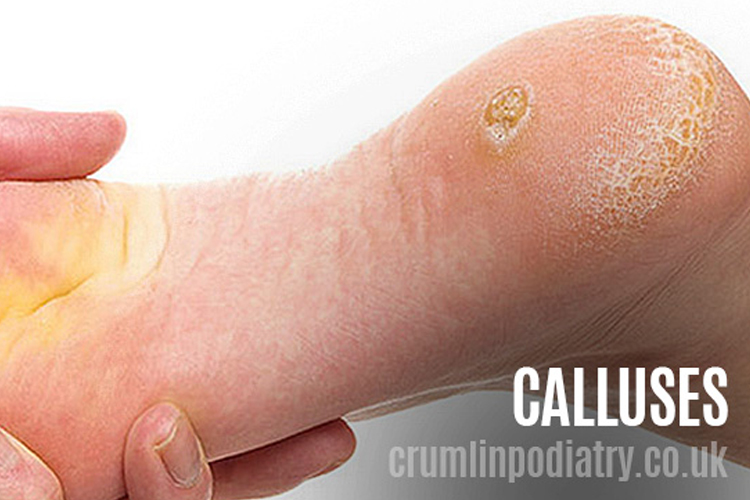
PREVENTION
- Be careful about walking around bare foot. It’s a leading cause of wearing your feet out on cement and rocks.
- Wear shoes that give your toes plenty of room. If you can’t wiggle your toes, your shoes are too tight. Have a shoe shop stretch your shoes at any point that rubs or pinches.
- Use protective coverings such as additional padding. Flt pads, non-medicated corn pads or band-aids over the area where rubbing occurs will be helpful. Toe separators or lamb’s wool between your toes can help.
- Calluses on hands – using a pair of gloves when you are in the garden or using tools can help and adding some tape, or additional padding to the handles of tools will be helpful.
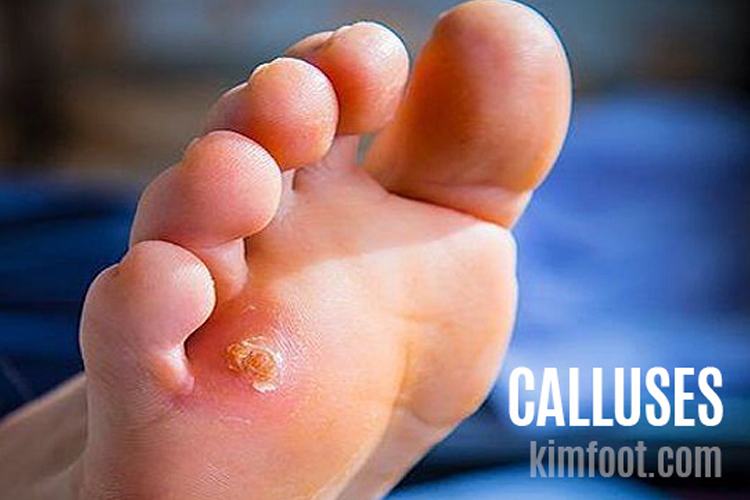
SHOULD YOU SEE A DOCTOR?
If a corn or callus is painful or becomes inflamed, consider seeing the doctor. If you have diabetes or poor blood flow, call your doctor before self-treatments on a corn or callus since even a light injury to your foot can lead to an infection (sore/ulcer).
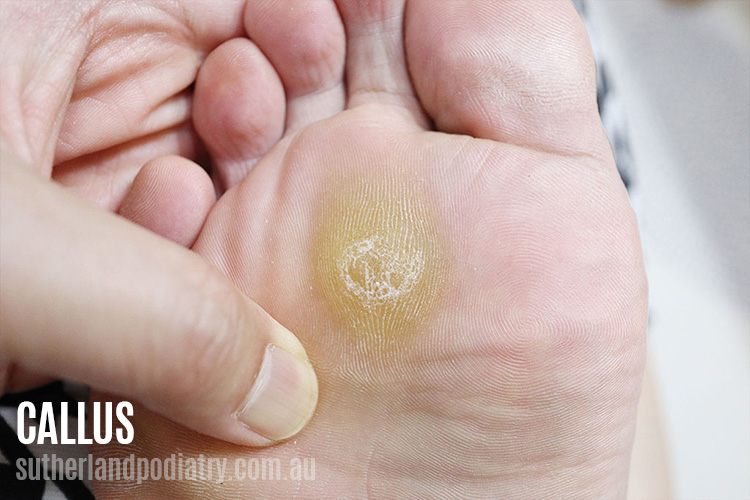
TREATMENT
There are a number of treatments for painful calluses. People who have calluses are cautioned against performing “bathroom surgery,” as this can lead to cuts and infection. A foot and ankle surgeon can evaluate the cause of the calluses and recommend the treatment most appropriate for your condition. However, if the underlying cause of the callus is not treated or removed, the callus may return.

WHAT ARE THEY?
Corns and calluses are skin that becomes thickened, hardened which develop as skin attempts to protect itself from repetitive motions like rubbing and strong, abnormal pressure. friction and pressure. They most often develop on the feet and toes or hands and fingers. Corns and calluses can be unsightly.
If you’re typically a healthy person, you’ll only need treatment for corns and calluses if they are causing you annoyance or pain. Typically by eliminating the source of the rubbing, or pressure makes corns and calluses disappear over time. Now, If you have Diabetes or another condition that causes poor blood flow to your feet, you’re at risk of complications. Seek the Doctor’s advice on care for corns and calluses when you have diabetes.

CAUSES OF CALLUSES
- Pressure and friction from repetitive actions cause corns and calluses to develop and grow. Some sources of this pressure and friction include:
- Wearing ill-fitting shoes. Tight shoes and high heels can compress areas of your feet. When footwear is too loose, your foot may repeatedly slide and rub against the shoe. Your foot may also rub against a seam or stitch inside the shoe.
- Skipping socks. Wearing shoes and sandals without socks can cause friction on your feet. Socks that don’t fit properly also can be a problem.
- Playing instruments or using hand tools. Calluses on your hands may result from the repeated pressure of playing instruments, using hand tools or even writing.

PREVENTION
- Be careful about walking around bare foot. It’s a leading cause of wearing your feet out on cement and rocks.
- Wear shoes that give your toes plenty of room. If you can’t wiggle your toes, your shoes are too tight. Have a shoe shop stretch your shoes at any point that rubs or pinches.
- Use protective coverings such as additional padding. Flt pads, non-medicated corn pads or band-aids over the area where rubbing occurs will be helpful. Toe separators or lamb’s wool between your toes can help.
- Calluses on hands – using a pair of gloves when you are in the garden or using tools can help and adding some tape, or additional padding to the handles of tools will be helpful.

SHOULD YOU SEE A DOCTOR?
If a corn or callus is painful or becomes inflamed, consider seeing the doctor. If you have diabetes or poor blood flow, call your doctor before self-treatments on a corn or callus since even a light injury to your foot can lead to an infection (sore/ulcer).

TREATMENT
There are a number of treatments for painful calluses. People who have calluses are cautioned against performing “bathroom surgery,” as this can lead to cuts and infection. A foot and ankle surgeon can evaluate the cause of the calluses and recommend the treatment most appropriate for your condition. However, if the underlying cause of the callus is not treated or removed, the callus may return.
